Kelly McCullough's Blog, page 56
July 18, 2011
More on Writing
Steph Swainston on writing, via Scalzi's blog. I have to say, her life doesn't sound that bad to me. But maybe she has higher standards than I do.
Published on July 18, 2011 16:44
God and SF
The Guardian asks: "What can science fiction tell us about God?"
Published on July 18, 2011 13:05
Who You Looking At?
Be careful when you insult someone by calling them a Neanderthal, you could be talking about yourself.
Published on July 18, 2011 06:20
July 15, 2011
Friday Cat Blogging Now With Bonus Cats!
I'm a mystery wrapped in an enigma
inside a cat bed inside an even bigger cat bed!

I are a huge poofy Halloween cat! Fear me!
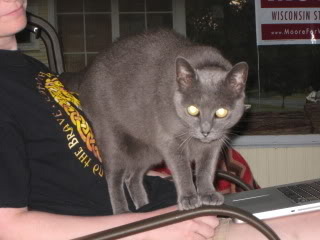
You have interrupted me in the middle of making my
ebil plans! Now I must keel you!

He's mine, I tell you, mine!
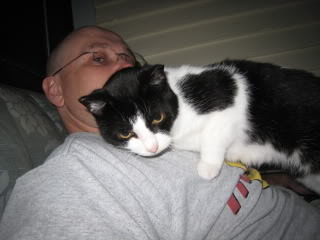
I lubs classic Dr Who, please paws this scene!

Put the lime in the coconut they said? Well, my
name is Coconut and I do not endorse this message
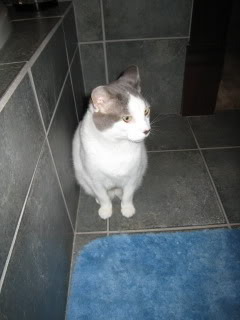
No you can't mail anything.
Can't you see I'm on break here?
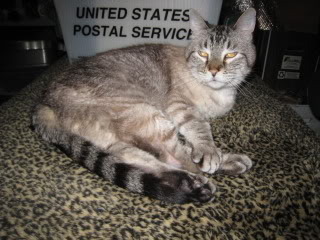
Didn't I kill you last week?
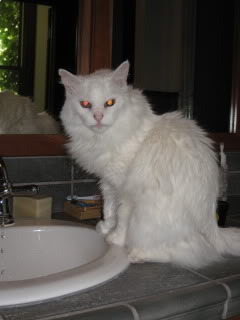

inside a cat bed inside an even bigger cat bed!

I are a huge poofy Halloween cat! Fear me!

You have interrupted me in the middle of making my
ebil plans! Now I must keel you!

He's mine, I tell you, mine!

I lubs classic Dr Who, please paws this scene!

Put the lime in the coconut they said? Well, my
name is Coconut and I do not endorse this message

No you can't mail anything.
Can't you see I'm on break here?

Didn't I kill you last week?

Published on July 15, 2011 10:42
July 14, 2011
How to Write Mid List Fiction # 1
I have been reading Kristine Katherine Rusch on the business of writing, because it's been a long time since I thought about writing as a business, and publishing is changing, due to Kindle and Nook. She sounds authoritative, and the topic is interesting to me at the moment.
Then I got to her advice on how to write, if you're going to survive as a writer. I'm less sure about this.
Rusch says writers should think of themselves as storytellers, rather than authors. I think she's telling people to not take themselves too seriously. Don't think of yourself as a fine art or literary writer.
She says writers should write fast, not worry about revising and not worry about style. Practice will make one a better writer and practice will enable one to find one's "voice."
According to Rusch, the famous writers -- the ones we still read, like Dickens and Shakespeare -- wrote fast. It is certainly my impression that Dickens was a fast writer. He wrote 14.5 novels in 34 years. That's half a large novel a year, which is impressive, but not as impressive as Rusch, who can write four to six novels a year.
Shakespeare wrote 1.6 plays a year during his working life, which is lot more than most modern playwrights, though Shaw must have him beat. Again, this is impressive, but not as impressive as the number of words Rusch has put out. Remember that a play script is a lot shorter than a novel.
Then there are the novelists who were far less prolific: Emily Bronte (1 novel), Charlotte Bronte (4), Herman Melville (4), Jane Austen (6), Lady Murasaki (1), Wu Cheng'en (2). This is off the top of my head. All these people are still read. I am not an Emily Bronte fan, but I love Jane Eyre, Moby Dick, The Tale of Genji, The Journey to the West and all of Jane Austen's novels.
I suspect all of these writers revised and thought about style. Shakespeare had an amazing vocabulary and was a master of the mot juste. I don't think that this came out of nowhere or even from writing a lot. It came from study and thought and craft. Here is Macbeth, after murdering King Duncan:
And from a dictionary:
I add the dictionary quote because it's interesting, and "incarnadine" is a neat word. It rolls off the tongue. Redness spills from it.
Then I got to her advice on how to write, if you're going to survive as a writer. I'm less sure about this.
Rusch says writers should think of themselves as storytellers, rather than authors. I think she's telling people to not take themselves too seriously. Don't think of yourself as a fine art or literary writer.
She says writers should write fast, not worry about revising and not worry about style. Practice will make one a better writer and practice will enable one to find one's "voice."
According to Rusch, the famous writers -- the ones we still read, like Dickens and Shakespeare -- wrote fast. It is certainly my impression that Dickens was a fast writer. He wrote 14.5 novels in 34 years. That's half a large novel a year, which is impressive, but not as impressive as Rusch, who can write four to six novels a year.
Shakespeare wrote 1.6 plays a year during his working life, which is lot more than most modern playwrights, though Shaw must have him beat. Again, this is impressive, but not as impressive as the number of words Rusch has put out. Remember that a play script is a lot shorter than a novel.
Then there are the novelists who were far less prolific: Emily Bronte (1 novel), Charlotte Bronte (4), Herman Melville (4), Jane Austen (6), Lady Murasaki (1), Wu Cheng'en (2). This is off the top of my head. All these people are still read. I am not an Emily Bronte fan, but I love Jane Eyre, Moby Dick, The Tale of Genji, The Journey to the West and all of Jane Austen's novels.
I suspect all of these writers revised and thought about style. Shakespeare had an amazing vocabulary and was a master of the mot juste. I don't think that this came out of nowhere or even from writing a lot. It came from study and thought and craft. Here is Macbeth, after murdering King Duncan:
Will all great Neptune's ocean wash this blood
Clean from my hand? No, this my hand will rather
The multitudinous seas incarnadine,
Making the green one red.
And from a dictionary:
incarnadine
1591 (adj.) "flesh-colored," from Fr. incarnadine, from It. incarnadino "flesh-color," from L.L. incarnatio (see incarnation). The verb properly would mean "to make flesh colored," but the modern meaning "make red," and the entire survival of the verb, is traceable to "Macbeth" II ii. (1605).
I add the dictionary quote because it's interesting, and "incarnadine" is a neat word. It rolls off the tongue. Redness spills from it.
Published on July 14, 2011 08:40
How to Write Mid List Fiction # 2
Rusch is talking about production writing. I borrow the term from weaving. When you go to an art fair and find handmade scarves for $50, you are looking at the work of a production weaver. Rather than make elaborate and difficult works, which will cost a lot and may not sell, she makes many works quickly: scarves, table runners, napkins. This is not bad work. Often it's lovely. But it's designed to be turned out quickly and to sell at an affordable price.
There are production potters and silversmiths. I have a lot of work by both. The point is to do work that is predictable and can be turned out quickly. Experiments take time and may fail and have to be redone. You do them to learn. But if every piece is an experiment, you are going to lose money.
Rusch excludes "literary" writers, the people who live off grants and teaching, from her discussion; and she excludes writers with day jobs, and writers who do well enough to publish a book every few years. As far as I know, Harper Lee has been living off To Kill a Mockingbird since 1960.
I think she underestimates the number of writers who can live off one book a year. That is the normal production rate for the mystery writers I read. This is time enough to revise and think about style, unless you are slow as I am.
But she is talking about production rates that amaze me: four to six books a year!
I can't argue with her advice to production writers. I can't imagine wanting to be one. I try to make everything I write an experiment of one kind or another. If I think I've written this particular story before, I toss it. I revise. I worry about style, constantly tinkering with words.
I have never come close to making a living as a writer. I once told an editor that what I made from writing kept me in conventions and Laura Ashley skirts. It's pocket money.
So, why do I write? To entertain myself. To deal with life. To impress my friends and relatives. To gain praise and pocket money. I would like undying fame, but will keep on without it.
There are production potters and silversmiths. I have a lot of work by both. The point is to do work that is predictable and can be turned out quickly. Experiments take time and may fail and have to be redone. You do them to learn. But if every piece is an experiment, you are going to lose money.
Rusch excludes "literary" writers, the people who live off grants and teaching, from her discussion; and she excludes writers with day jobs, and writers who do well enough to publish a book every few years. As far as I know, Harper Lee has been living off To Kill a Mockingbird since 1960.
I think she underestimates the number of writers who can live off one book a year. That is the normal production rate for the mystery writers I read. This is time enough to revise and think about style, unless you are slow as I am.
But she is talking about production rates that amaze me: four to six books a year!
I can't argue with her advice to production writers. I can't imagine wanting to be one. I try to make everything I write an experiment of one kind or another. If I think I've written this particular story before, I toss it. I revise. I worry about style, constantly tinkering with words.
I have never come close to making a living as a writer. I once told an editor that what I made from writing kept me in conventions and Laura Ashley skirts. It's pocket money.
So, why do I write? To entertain myself. To deal with life. To impress my friends and relatives. To gain praise and pocket money. I would like undying fame, but will keep on without it.
Published on July 14, 2011 08:39
July 13, 2011
The Last Approach

For the last time, the US Space Shuttle has approached the International Space Station (ISS). Following a dramatic launch from Cape Canaveral last week that was witnessed by an estimated one million people, Space Shuttle Atlantis on STS-135 lifted a small crew to a welcome rendezvous three days ago with the orbiting station. Although NASA is discontinuing the aging shuttle fleet, NASA astronauts in the near future will be able to visit the ISS on Russian space flights. Pictured above, Atlantis rises toward the ISS with its cargo bay doors open, showing a gleaming metallic Raffaello Multi-Purpose Logistics Module. Over 200 kilometers below lie the cool blue waters of planet Earth. The much-anticipated last glide back to Earth for the Space Shuttle is currently scheduled for next Thursday, July 21.
Published on July 13, 2011 06:47
July 12, 2011
More Book Stuff
How to have a successful booksigning at "Pimp My Novel" (did you even know such a blog existed?)
Also, the day before, the same blog dicusses to self-publish or not.
Also, the day before, the same blog dicusses to self-publish or not.
Published on July 12, 2011 07:50
July 10, 2011
In Reply to Shawn re. e-books and self-publishing
The following began as a reply to Shawn Enderlin's comment on Eleanor's post re. e-publishing. Mine got long enough that a full post seemed appropriate....
I see you point Shawn, but I think the sky isn't going to be falling quite so fast or completely as some people are claiming. E-books are taking up a larger share of the market, but the number of people with e-readers is still a smaller percentage of the overall reading public. This, too, will change, but I don't see it becoming an all-or-nothing situation, as is so often seems to be painted by some e-advocates.
Too often, I think people forget the essential privileged status of the e-reader user. People who either choose not to use, or cannot afford, electronic readers/smart phones/tablets will still need a reading medium, as will many libraries and other markets. POD (print on demand) could help satisfy some of this, but that assumes either an awareness or an accessibility by the general reading public that isn't a guaranteed constant. In short, there will still be a need to more traditional, or traditional-like, distribution channels for a long time. The need may shrink, or alter, of the like, but it will be there.
By its very nature, one of the challenges of self-publishing is the exact thing you mention: distribution (in terms of people seeing your title in various locales). Yes, there are examples of people making money by self-pubbed books, but these still tend to be the notable exceptions. When you look at the vast raft of self-pubbed e-books out there, the trick is not being a success, but even getting noticed. Admittedly, this is also a problem for traditional print authors as well. I point this out not as a dig at self-pubbing, but rather because, in the case of e-pubbing, I see it too often brushed over with the "the reader will will find you if the book is good enough" placebo. That is true of either medium, and you can find examples of authors on this very blog who could tell you about the challenges of being "found" in a narrower pool (paper book) than you are looking at in the e-end. Going kindle isn't going to solve the fundamental challenge of being picked up by a reader.
I don't dismiss the power and potential of e-books and self-pubbing, but I also don't think it is the high-holy that its strongest advocated are painting it to be, either. Traditional publishing is going to have to change, and it may be ugly for a while; but I think there is still a basic enough desire and need for the services and products they provide that people shouldn't be writing them off without doing their own homework first (as you seem to have done), rather than simply following the band leader of choice (which I have seen others do).
At base, publishing is a business: deciding whether you want to sign on with a firm (traditional publishing) or have your own start-up (self-publishing) deserves just as much thought and research as starting a brick and mortar establishment in some ways. Each brings benefits and challenges, and neither is the end-all, be-all at this point in time; nor will they be for some time to come, IMO.
I see you point Shawn, but I think the sky isn't going to be falling quite so fast or completely as some people are claiming. E-books are taking up a larger share of the market, but the number of people with e-readers is still a smaller percentage of the overall reading public. This, too, will change, but I don't see it becoming an all-or-nothing situation, as is so often seems to be painted by some e-advocates.
Too often, I think people forget the essential privileged status of the e-reader user. People who either choose not to use, or cannot afford, electronic readers/smart phones/tablets will still need a reading medium, as will many libraries and other markets. POD (print on demand) could help satisfy some of this, but that assumes either an awareness or an accessibility by the general reading public that isn't a guaranteed constant. In short, there will still be a need to more traditional, or traditional-like, distribution channels for a long time. The need may shrink, or alter, of the like, but it will be there.
By its very nature, one of the challenges of self-publishing is the exact thing you mention: distribution (in terms of people seeing your title in various locales). Yes, there are examples of people making money by self-pubbed books, but these still tend to be the notable exceptions. When you look at the vast raft of self-pubbed e-books out there, the trick is not being a success, but even getting noticed. Admittedly, this is also a problem for traditional print authors as well. I point this out not as a dig at self-pubbing, but rather because, in the case of e-pubbing, I see it too often brushed over with the "the reader will will find you if the book is good enough" placebo. That is true of either medium, and you can find examples of authors on this very blog who could tell you about the challenges of being "found" in a narrower pool (paper book) than you are looking at in the e-end. Going kindle isn't going to solve the fundamental challenge of being picked up by a reader.
I don't dismiss the power and potential of e-books and self-pubbing, but I also don't think it is the high-holy that its strongest advocated are painting it to be, either. Traditional publishing is going to have to change, and it may be ugly for a while; but I think there is still a basic enough desire and need for the services and products they provide that people shouldn't be writing them off without doing their own homework first (as you seem to have done), rather than simply following the band leader of choice (which I have seen others do).
At base, publishing is a business: deciding whether you want to sign on with a firm (traditional publishing) or have your own start-up (self-publishing) deserves just as much thought and research as starting a brick and mortar establishment in some ways. Each brings benefits and challenges, and neither is the end-all, be-all at this point in time; nor will they be for some time to come, IMO.
Published on July 10, 2011 22:02
Storm on Saturn (Courtesy of Cassini and NASA)

A storm on Saturn, so big that it wraps all the way around the planet. Photo taken by the Cassini space probe and posted on Phil Plait's Bad Astronomy blog.
Published on July 10, 2011 08:17
Kelly McCullough's Blog
- Kelly McCullough's profile
- 369 followers
Kelly McCullough isn't a Goodreads Author
(yet),
but they
do have a blog,
so here are some recent posts imported from
their feed.



